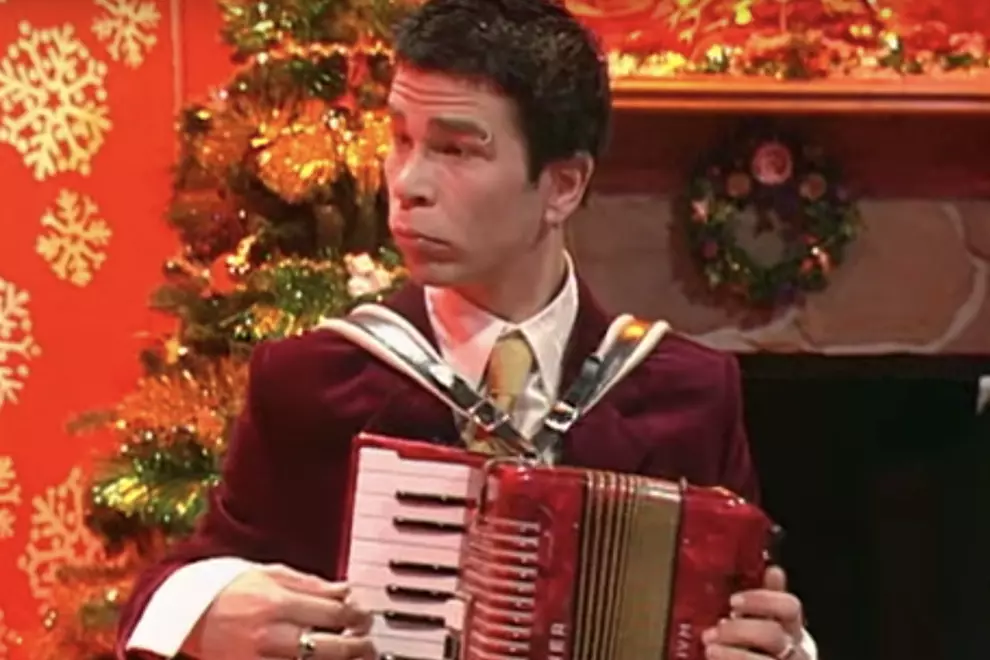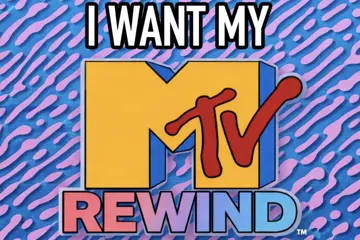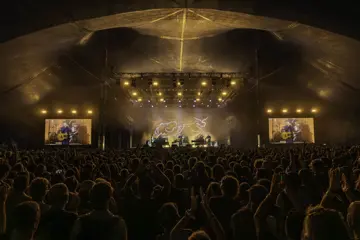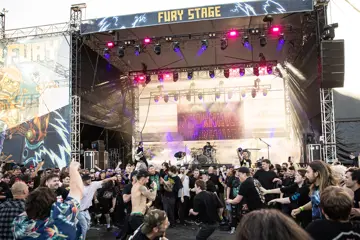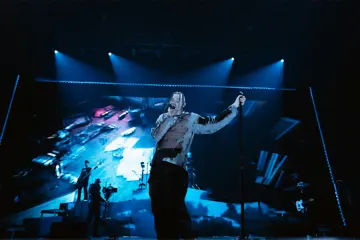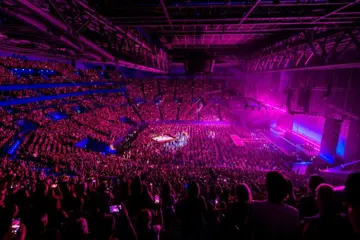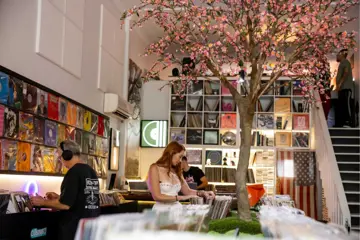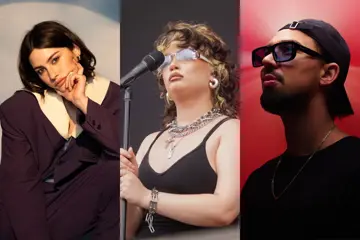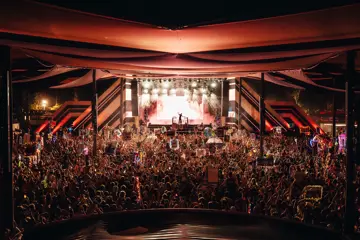This weekend’s one-hour Recovery documentary captures a “magical time in Australian music history”, according to the host of the beloved '90s music show Dylan Lewis.
We interviewed the master interviewer about some of his best, most bizarre and heartbreaking interviews ahead of tomorrow’s premiere.
“You plan three or four hundred different scenarios, all of them ending when you and your hero become best mates and decide to record together,” Lewis said.
“That’s the conversation you always lead to with your 300 hypothetical scenarios and it never does go that way; it goes a terribly wrong way. It happens every time I talk with an idol and it’s never gone well.”
Here are just a few of those moments.
The Jon Spencer Blues Explosion
What a very good place to start! That was one of the bands I didn’t know much about before they came on, so I did all my research, as I did for all the artists and guests, so I learnt a bit about them, but I wasn’t prepared for what was going to happen on the stage in front of all of the young, innocent audience members. When Jon Spencer started, the energy changed in the room and I started to get goosebumps in places I didn’t know you could get goosebumps. The rock’n’roll started and then the theremin was going and the audience was like, ‘What’s actually going on here? Why is everyone feeling this weird way?!’ It was like a kid’s party when you give them too much sugar and then everyone just runs in circles for a while.
Then Jon Spencer starts coming into the audience and high-fiving people and falling over people and then he goes and rips the set down and then he goes and knocks my best friend’s coffee out of his hand. I’m standing there going, ‘Oh my god, this is the greatest moment that’s ever happened on television and I’m standing here watching it live. How wonderful and magical.’ At the end of it, I think I said something like, ‘Yep, my life is complete. This is what we came here to do, this is what rock’n’roll is.’ It was such an amazing, transformative moment and it really did make me realise how powerful [Recovery] could be.
Don't miss a beat with our FREE daily newsletter
Jon Spencer Blues Explosion changed my life. And I found my Jon Spencer Blues Explosion CD the other day, and I got them to sign it and Jon Spencer has written, ‘Yo, host!’ He didn’t even know my name [laughs].
Public Enemy
Just to put this in context for you, Public Enemy was the first time I got into hip hop…my brother had a record, It Takes A Nation Of Millions To Hold Us Back, and we tried to learn all the lyrics from the liner notes because it was vinyl. I remember going on car journeys – this is in the day before iPads and also the day before it was bad to smoke in the car and the day before it was bad to have no seatbelt – and we would just learn lyrics in the back of the car, like ‘Don’t believe the hype!’ and all that kind of stuff, two little suburban kids getting around the suburbs just learning some Public Enemy [laughs].
So when Public Enemy comes on the show, I’m losing my shit. It’s like, ‘This is real – oh my god, my heroes.’ These are the guys that not only got me into hip hop but then taught me that hip hop can be something that makes a difference.
They come onto [Recovery] and the vibe is full-on, and they’ve got their entourage and there’s everyone. They were rehearsing and I’m sitting on the host set going, ‘Oh my god, that’s Public Enemy.’ I hadn’t met them yet, they were just coming in and doing their soundcheck, and then I realised that all the cameras were on them… and that their red lights are on… ‘Hang on, we’re filming their soundcheck! This is going to air live – what are you doing!’
They didn’t know that it was going to air, so everyone is just mucking around. They play a little bit of a verse and then Flavor Flav is like, ‘Yo, are we on?’
I’m getting these wild gesticulations from floor managers who are receiving signals from the directors who are saying, ‘Just keep going, this will be fine.’ And so they said, ‘Do the interview now!’ And I’m like, ‘What?! Oh, okay.’ So I was standing in the middle of the floor, and then I just sat down on the floor and then Chuck D and Flavour Flav sat on the floor next to me and we did the interview on the bloody floor instead of on the couch! These are my heroes and there we are, sat on the floor.
And while they were making their way over, I thought, ‘I know what I’ll do to fill in some time while they’re making their way over – I’ll do some Public Enemy rapping to Chuck D.’ What an idiot! It was bizarre and so surreal. Looking back on the footage, that chaos and that anarchy, that epitomised what Recovery was and the mayhem was actually what was going on inside my body at the time. Everyone was just like, ‘What is going on? This is Public Enemy, one of the biggest hip hop bands in the world and they’re sitting on the floor.’
The Brown Hornet
I always try to squeeze The Brown Hornet into any project I’m ever doing and, again, right now, I’ve managed to squeeze The Brown Hornet in. I mean, this is embarrassing, why would you bring up The Brown Hornet? It’s my own band. For god’s sake.
Alright, I’ll talk about it for a little bit… When I was allowed to host TV shows like Recovery, I’d always say at some stage, ‘Hey, do you reckon my band, my weird art funk band, could come on?’ And they’d always say, ‘Maybe on the last show of the season.’ There we’d be, thinking we too are musicians, just like all the other musicians.
We felt so part of it. I mean, we all felt like musicians, but we didn’t feel like rockstars. But then when you go on Recovery and you get the Recovery treatment, it’s like, ‘Ohhh, we’ve got a green room, we get thrown to by a host.’ Which, you know, was usually me throwing to myself, but none the less.
The Brown Hornet played a few times on Recovery and it was good for me to be able to do that as well because it helped me with my empathy for what it was like for the other bands because you still get scared. You get your three or four minutes to prove yourself and it’s live, you don’t want to stuff up and you don’t sort of lead up to your song, you just do your song and then you’re off. These poor bands didn’t have the luxury of having been on set the whole time, whereas it was a comfortable-ish space for me.
That was a good thing for me to go through and I think that’s part of the reason I got to do the job in the first place; I came from a musician's background and grew up with music and playing in bands and touring around in stinky vans and knowing the reality of the situation and how unromantic it is.
Sting
Now Sting goes into the category of heroes it doesn’t go well with. I remember growing up as a teenager…I had [Sting’s] The Dream Of The Blue Turtles on tape. I listened to that religiously, so much that the tape snapped at one stage and I had to sticky tape it back together. I loved The Police too, I think they’re fantastic and clever and Sting’s voice is ridiculous.
So I met him! He comes on set and I’m like, ‘Yeah, this is one of those times where we’re going to become mates, he’s going to it.’ And he didn’t – he thought I was a knob.
When he came on he was a little older than he was in the early ‘80s, and I think he was a little bit defensive and thinking, ‘I’m pretty sure this guy’s gonna take the mickey out of me a little bit at some stage.’ And I’m sitting there going, ‘No, no, no, no, no – I love you and I’m not lying. And even though it looks like I’m lying - because that’s what happens to my face when I say I’m not lying – I’m not lying. Please believe the dude behind the eyebrow ring is the dude who grew up listing to you and whose music taste is heavily defined by your music.’
By the end of it, he looked at my bracelet and there was some kind of ancient writing on there or mantra and I said, ‘Do you know what this might say?’ Because he had one on too. And he said, ‘Well, your one says ‘Made In China’.’ And I was like, ‘Oh, no! You still think I’m a knob.
It didn’t go well from the start because maybe I was a knob, whilst not meaning to be a knob. I started the interview by saying, ‘Hello, Gordon.’ Because that’s his real name, but he doesn’t want people to call him Gordon in interviews by young people in Australia. He wants to be called Sting. And then I went and called him Gordon.
Björk
I put Björk down because, in the lead up to this Recovery documentary coming up, I’ve been finding my old files and boxes of paraphernalia and old photos and stuff and I found a lovely photo that Björk had written on and it says, ‘To Recovery/ABC, from Björk.’
I got to keep that because she was my very first musical interview and was on Recovery and I had no clue what I was going and it was weird.
It was in a gallery and my interview pretty much consisted of me showing her a tiny handheld camcorder with school children asking her questions, so I didn’t even ask her any questions, I just had to facilitate this camera with the questions that she could barely hear on it and she would answer their questions. ‘Hi, Björk! What is it like being a singer?!’
That went really well because at the end of the interview she told the producers that I looked like her son [laughs]. And, of course, as a young man meeting Björk in the ‘90s, she is beautiful and so that kind of wrecked it a little bit – I couldn’t really have a crush on her anymore.
That interview was the start of the rest of my life. My whole career has come after that moment and was a poignant one for me.

----------
Recovery: The Music And The Mayhem will premiere at 9am on Saturday 23 November, followed by an additional screening on Wednesday 27 November at 9pm. The latter screening with be the "ruder, louder, uncut version".

